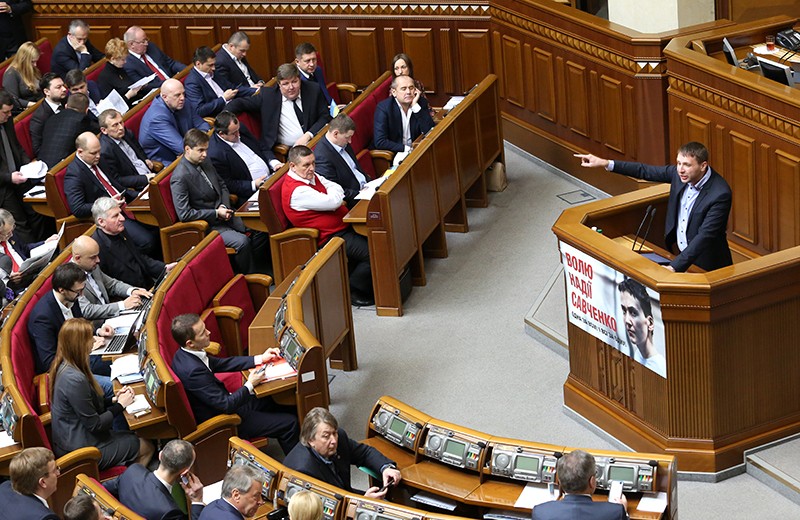More than 500 police officers have signed a letter demanding that lawmaker Volodymyr Parasiuk be stripped of his parliamentary immunity from prosecution.
Head of the National Police in Donetsk region Vyacheslav Abroskin said in a March 17 Facebook post that he will deliver the letter to Ukrainian President Petro Poroshenko, Chairman of the Verkhovna Rada Andriy Parubiy, and Prosecutor General of Ukraine Yuriy Lutsenko.
The letter accuses Parasiuk of “behaving in a manner not acceptable for a representative of the nation.”
Abroskin’s post came in the wake of an incident on March 14, when police and a group of activists including Parasiuk clashed at a checkpoint on the outskirts of Sloviansk, a Donetsk Oblast city about 600 kilometers southeast of Kyiv.
Parasuik clashed with police after the convoy of 13 cars he was in, along with about 35 people, was stopped as it was traveling to join the rail blockade in the east of the country. The blockade has for weeks stopped deliveries of goods from the Russian-occupied parts of the Donbas to the rest of Ukraine.
Police asked to search the cars, but the occupants refused. The confrontation escalated to the point that police fired warning shots with automatic weapons over the activists’ heads.
The convoy moved off but was stopped again near Kramatorsk, about 20 kilometers south. In this incident, according to the police officers’ letter, Parasiuk “used offensive language, started a fight and rudely threatened the police officers’ families.”
“We won’t let anybody beat us up and humiliate us, because there might be such a reaction to the insults and threats to our families, that one cannot even predict,” Abroskin said in his Facebook post accompanying a photograph of the letter.
Parasiuk, meanwhile, gave his own version of events on his Facebook page, saying that on the night of the conflict the deputy head of Kramatorsk police department Andiy Drumov assaulted him, his sister and his assistant Iryna Holub, and sprayed gas at his father, taking away from him his “legally possessed weapon.”
“(Parasiuk’s) eyes and arm were injured, but he refused to be hospitalized,” Holub told news website Ukrainska Pravda, commenting on the incident.
Parasiuk and the convoy had been travelling to a location near the town of Toretsk where a railway blockade point had been broken up by Ukraine’s SBU security service on March 13. Around 30 activists taking part in the blockade were arrested by the police and SBU.
In late February, Donbas volunteer battalion veterans blocked the railway lines leading from the Russian-occupied parts of the Donbas, calling for the release of prisoners of war and a halt to rampant smuggling across the front lines.
However, the main effect of the blockade was to halt anthracite coal deliveries to power stations in government-controlled Ukraine, leading the government to declare a state of emergency in the energy sector on Feb. 15.
Separatists in control of parts of Donetsk and Luhansk oblasts in early March seized control of dozens of Ukrainian-owned businesses still operating in their territories, which they said was in retaliation at the imposition of the blockade.
The Ukrainian government on March 15 ordered its own blockade of the Russian-occupied parts of the Donbas, demanding that the separatists return control of the companies they had seized to their owners.
Parasiuk was elected to parliament in October 2014 as an independent. He rose to prominence during the EuroMaidan mass public protests of the winter of 2013-2014, when he delivered a speech from the stage on Maidan Nezalezhnosti on Feb. 21, 2014 calling for the armed overthrown of former Ukrainian President Viktor Yanukovych.
He has been involved in several scuffles and assaults during his time as a lawmaker, both in parliament and in its committee buildings.



